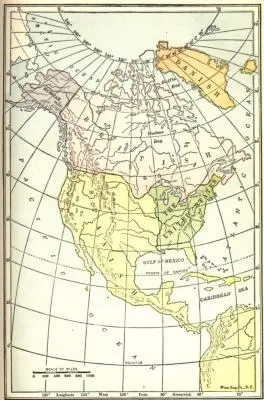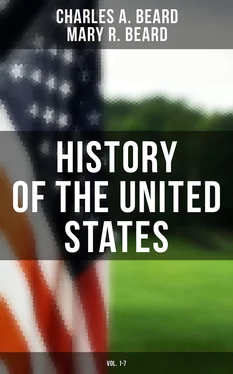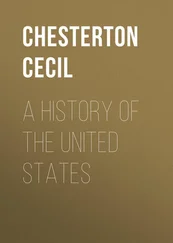In April, 1782, Franklin received word from the English government that it was prepared to enter into negotiations leading to a settlement. This was embarrassing. In the treaty of alliance with France, the United States had promised that peace should be a joint affair agreed to by both nations in open conference. Finding France, however, opposed to some of their claims respecting boundaries and fisheries, the American commissioners conferred with the British agents at Paris without consulting the French minister. They actually signed a preliminary peace draft before they informed him of their operations. When Vergennes reproached him, Franklin replied that they "had been guilty of neglecting bienséance [good manners] but hoped that the great work would not be ruined by a single indiscretion."
The Terms of Peace (1783).—The general settlement at Paris in 1783 was a triumph for America. England recognized the independence of the United States, naming each state specifically, and agreed to boundaries extending from the Atlantic to the Mississippi and from the Great Lakes to the Floridas. England held Canada, Newfoundland, and the West Indies intact, made gains in India, and maintained her supremacy on the seas. Spain won Florida and Minorca but not the coveted Gibraltar. France gained nothing important save the satisfaction of seeing England humbled and the colonies independent.
The generous terms secured by the American commission at Paris called forth surprise and gratitude in the United States and smoothed the way for a renewal of commercial relations with the mother country. At the same time they gave genuine anxiety to European diplomats. "This federal republic is born a pigmy," wrote the Spanish ambassador to his royal master. "A day will come when it will be a giant; even a colossus formidable to these countries. Liberty of conscience and the facility for establishing a new population on immense lands, as well as the advantages of the new government, will draw thither farmers and artisans from all the nations. In a few years we shall watch with grief the tyrannical existence of the same colossus."

North America according to the Treaty of 1783
Summary of the Revolutionary Period
The independence of the American colonies was foreseen by many European statesmen as they watched the growth of their population, wealth, and power; but no one could fix the hour of the great event. Until 1763 the American colonists lived fairly happily under British dominion. There were collisions from time to time, of course. Royal governors clashed with stiff-necked colonial legislatures. There were protests against the exercise of the king's veto power in specific cases. Nevertheless, on the whole, the relations between America and the mother country were more amicable in 1763 than at any period under the Stuart régime which closed in 1688.
The crash, when it came, was not deliberately willed by any one. It was the product of a number of forces that happened to converge about 1763. Three years before, there had come to the throne George III, a young, proud, inexperienced, and stubborn king. For nearly fifty years his predecessors, Germans as they were in language and interest, had allowed things to drift in England and America. George III decided that he would be king in fact as well as in name. About the same time England brought to a close the long and costly French and Indian War and was staggering under a heavy burden of debt and taxes. The war had been fought partly in defense of the American colonies and nothing seemed more reasonable to English statesmen than the idea that the colonies should bear part of the cost of their own defense. At this juncture there came into prominence, in royal councils, two men bent on taxing America and controlling her trade, Grenville and Townshend. The king was willing, the English taxpayers were thankful for any promise of relief, and statesmen were found to undertake the experiment. England therefore set out upon a new course. She imposed taxes upon the colonists, regulated their trade and set royal officers upon them to enforce the law. This action evoked protests from the colonists. They held a Stamp Act Congress to declare their rights and petition for a redress of grievances. Some of the more restless spirits rioted in the streets, sacked the houses of the king's officers, and tore up the stamped paper.
Frightened by uprising, the English government drew back and repealed the Stamp Act. Then it veered again and renewed its policy of interference. Interference again called forth American protests. Protests aroused sharper retaliation. More British regulars were sent over to keep order. More irritating laws were passed by Parliament. Rioting again appeared: tea was dumped in the harbor of Boston and seized in the harbor of Charleston. The British answer was more force. The response of the colonists was a Continental Congress for defense. An unexpected and unintended clash of arms at Lexington and Concord in the spring of 1775 brought forth from the king of England a proclamation: "The Americans are rebels!"
The die was cast. The American Revolution had begun. Washington was made commander-in-chief. Armies were raised, money was borrowed, a huge volume of paper currency was issued, and foreign aid was summoned. Franklin plied his diplomatic arts at Paris until in 1778 he induced France to throw her sword into the balance. Three years later, Cornwallis surrendered at Yorktown. In 1783, by the formal treaty of peace, George III acknowledged the independence of the United States. The new nation, endowed with an imperial domain stretching from the Atlantic Ocean to the Mississippi River, began its career among the sovereign powers of the earth.
In the sphere of civil government, the results of the Revolution were equally remarkable. Royal officers and royal authorities were driven from the former dominions. All power was declared to be in the people. All the colonies became states, each with its own constitution or plan of government. The thirteen states were united in common bonds under the Articles of Confederation. A republic on a large scale was instituted. Thus there was begun an adventure in popular government such as the world had never seen. Could it succeed or was it destined to break down and be supplanted by a monarchy? The fate of whole continents hung upon the answer.
PART III. THE UNION AND NATIONAL POLITICS
Table of Contents
Конец ознакомительного фрагмента.
Текст предоставлен ООО «ЛитРес».
Прочитайте эту книгу целиком, купив полную легальную версию на ЛитРес.
Безопасно оплатить книгу можно банковской картой Visa, MasterCard, Maestro, со счета мобильного телефона, с платежного терминала, в салоне МТС или Связной, через PayPal, WebMoney, Яндекс.Деньги, QIWI Кошелек, бонусными картами или другим удобным Вам способом.













